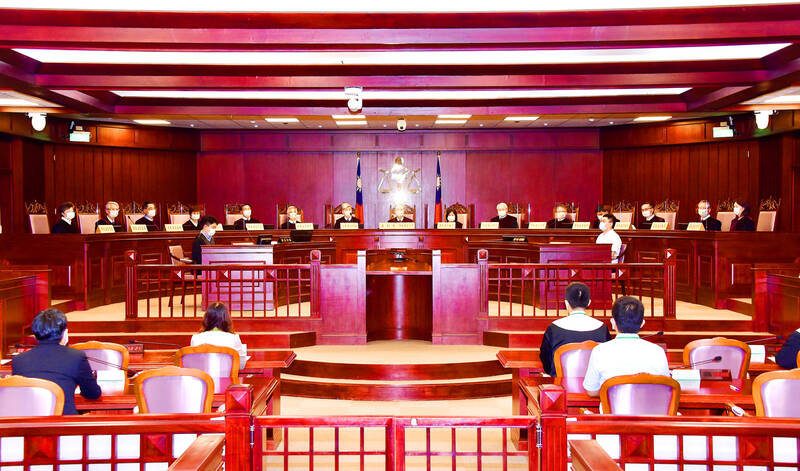The Constitutional Court is to hear arguments tomorrow on whether an article in the Civil Code limiting the circumstances in which couples can file for divorce contravenes the Constitution’s protection of individual freedoms.
The case relates to Clause 2, Article 1052 of the Civil Code, which states that a husband or wife can petition for divorce upon the occurrence of an event that renders it difficult to maintain the marriage.
However, if only one party is “responsible for the event,” then “only the other party may petition for divorce,” the clause says.

Photo: Tu Chien-jung, Taipei Times
Kaohsiung Juvenile and Family Court Judge Chu Cheng-kun (朱政坤) applied for the constitutional interpretation based on three cases that are before him.
Chu said that the clause contravenes the right to divorce as protected under Article 22 of the Republic of China Constitution, and also contradicts previous rulings by the court, including Interpretation No. 791, which decriminalized adultery.
In addition to limiting people’s freedom to end a relationship, the law also has the practical effect of devaluing marriage by allowing it to be used to “trap” individuals in relationships that only exist in official documents, Chu said.
A case coclaimant surnamed Fang (方) has been unable to divorce a woman he married more than 50 years ago, even though he has since raised three children with another woman in Hong Kong.
Fang said that the law has found him to be “responsible” for the difficulties in his marriage and was deemed ineligible to file for divorce.
The law is to be defended in the case by the Ministry of Justice.
Previously, the ministry has said that in cases where an event has made it difficult to maintain a marriage, both parties are often found responsible and thus have sufficient grounds for divorce.
It has also said that any potential amendments to the law should be left to the Legislative Yuan and not be decided by the courts.
Arguments in the case are to be heard starting at 9:30am tomorrow.
The proceedings are to be open to the public and broadcast live on the Internet.

A preclearance service to facilitate entry for people traveling to select airports in Japan would be available from Thursday next week to Feb. 25 at Taiwan Taoyuan International Airport, Taoyuan International Airport Corp (TIAC) said on Tuesday. The service was first made available to Taiwanese travelers throughout the winter vacation of 2024 and during the Lunar New Year holiday. In addition to flights to the Japanese cities of Hakodate, Asahikawa, Akita, Sendai, Niigata, Okayama, Takamatsu, Kumamoto and Kagoshima, the service would be available to travelers to Kobe and Oita. The service can be accessed by passengers of 15 flight routes operated by

GIVE AND TAKE: Blood demand continues to rise each year, while fewer young donors are available due to the nation’s falling birthrate, a doctor said Blood donors can redeem points earned from donations to obtain limited edition Formosan black bear travel mugs, the Kaohsiung Blood Center said yesterday, as it announced a goal of stocking 20,000 units of blood prior to the Lunar New Year. The last month of the lunar year is National Blood Donation Month, when local centers seek to stockpile blood for use during the Lunar New Year holiday. The blood demand in southern Taiwan — including Tainan and Kaohsiung, as well as Chiayi, Pingtung, Penghu and Taitung counties — is about 2,000 units per day, the center said. The donation campaign aims to boost

ENHANCING EFFICIENCY: The apron can accommodate 16 airplanes overnight at Taoyuan airport while work on the third runway continues, the transport minister said A new temporary overnight parking apron at Taiwan Taoyuan International Airport is to start operating on Friday next week to boost operational efficiency while the third runway is being constructed, the Ministry of Transportation and Communications said yesterday. The apron — one of the crucial projects in the construction of the third runway — can accommodate 16 aircraft overnight at the nation’s largest international airport, Minister of Transportation and Communications Chen Shih-kai (陳世凱) told reporters while inspecting the new facility yesterday morning. Aside from providing the airport operator with greater flexibility in aircraft parking during the third runway construction,

American climber Alex Honnold is to attempt a free climb of Taipei 101 today at 9am, with traffic closures around the skyscraper. To accommodate the climb attempt and filming, the Taipei Department of Transportation said traffic controls would be enforced around the Taipei 101 area. If weather conditions delay the climb, the restrictions would be pushed back to tomorrow. Traffic controls would be in place today from 7am to 11am around the Taipei 101 area, the department said. Songzhi Road would be fully closed in both directions between Songlian Road and Xinyi Road Sec 5, it said, adding that bidirectional traffic controls would